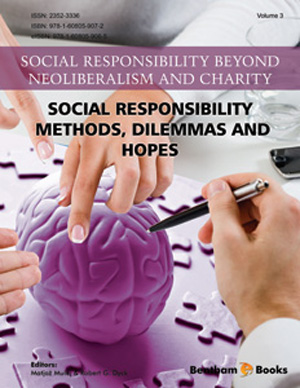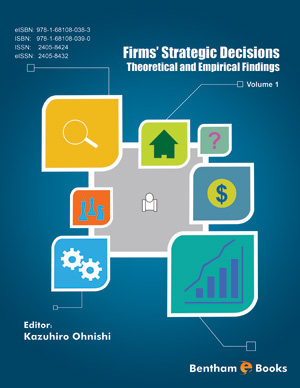List of Contributors
Page: viii-ix (2)
Author: Matjaž Mulej and Robert G. Dyck
DOI: 10.2174/9781608059068114030003
Support to Ethics of Interdependence and Holism by Edward de Bono’s Methods of Thinking
Page: 3-27 (25)
Author: Matjaž Mulej and Nastja Mulej
DOI: 10.2174/9781608059068114030004
PDF Price: $15
Abstract
The current detrimental practice of one-sided, arguing (‘with argument’) and short-term thinking must be replaced for humankind to develop beyond neoliberalism and survive. De Bono’s Lateral Thinking focuses on creativity and idea generation, Parallel Thinking on good, tolerant and requisitely holistic cooperation in it. In reviewing de Bono’s literature, the main frameworks that have been identified are: Lateral Thinking; D.A.T.T; CoRT1, The Six Thinking Hats, Simplicity and The Six Value Medals. The researchers’ focus converges towards CoRT1. This was consciously done since it is the most used in the teaching of thinking skills in schools and is comprehensive of most thinking dispositions. The above frameworks are best known in education; they are also applied in other areas such as business; education for modern thinking is necessary there too. The essence of the CoRT Thinking Method is to focus attention directly on different aspects of thinking and to crystalline these aspects into definite concepts and tools that can be used deliberately. The essence of ‘6 Thinking Hats’ as a tool of parallel thinking is holism by interdependence: all team members think from the same viewpoint in the same phase, and all of them switch to another ‘hat’ together in the next phase. Social responsibility results from such experience.
Capability of New Systems Theories to Help Escape the Crisis
Page: 28-46 (19)
Author: Vesna Čančer and Matjaž Mulej
DOI: 10.2174/9781608059068114030005
PDF Price: $15
Abstract
Developing new systems theories has proved fruitful. Examples developed at the University of Maribor include the following: (A) Control Systems that provide information to managers of public sector organizations about how to render management style more requisitely holistic and more successful; (B) Dialectical Network Thinking that provides similar information to organizations based on networking, such as railways; (C) Business Cybernetics that provides similar information to managers of any organization, as a business system; (D) Universal DST that builds a bridge between social and natural sciences to help civilization assure its own sustainable development and future viability. (E) Fourth order Cybernetics can help human beings attain the requisite holism of the human approach and the requisite wholeness of outcomes of human action. (F) Requisitely holistic inventive/innovative project management can help managers mastering strategic changes and crises in business systems. (G) Quantified DST attempts to fortify requisitely holistic thinking with quantitative and qualitative methods supportive of decision making on a requisitely holistic basis; it enables consideration of all dimensions of sustainable performance: economic, environmental, ethical and social. Its prescriptive models enable sensible use of intuition and experience in crisis, including affluence situations.
Trust Management by Computer Simulation: Towards a Fair, Responsible and Sustainable Economy
Page: 47-66 (20)
Author: Denis Trček
DOI: 10.2174/9781608059068114030006
PDF Price: $15
Abstract
Trust is crucial among the factors that play important roles in establishing fair, responsible, and sustainable economies. However, trust belongs to that domain of complex phenomena known as non-linear dynamic systems. Its research requires systemic and interdisciplinary approaches. A new approach to better understanding of trust has been introduced recently with the methodology called Qualitative Assessment Dynamics (QAD), as presented in this chapter. By being anthropocentric it complements other trustfocused methods that exist in the social sciences, computer and information sciences, and multidisciplinary settings. It is based on experimental research and focuses on computer simulations to help decision makers in organizations and societies address such questions as, “How should we manage an organization or a society in order to achieve a situation where the majority of its members trust one another?” and “How more trustful is our organization than that of our competition, and why?”
A New Fractal Metric for Social Responsibility
Page: 67-78 (12)
Author: Robert G. Dyck
DOI: 10.2174/9781608059068114030007
PDF Price: $15
Abstract
This chapter will present a new fractal "metric" for social responsibility, designed to teach planners, administrators, and political decision-makers, within a reasonably short time frame, how to design and implement socially responsible plans and policies. Fractal design provides a common denominator for socially responsible work in economics, politics, international relations, environmental sustainability, etc., by helping to solve scale problems that typically are not well solved in current practice.
All of the above functional systems are characterized by inter-scale linkage problems, i.e. poor linkages between the large, intermediary, and small components. Fractal design provides a metric that requires many more small and intermediary components than large ones, with richer nodal connections for the large ones. In addition, the fractal principle of self-similarity provides the basis for energy, information, and money transfer between the different scales, thus promoting system sustainability. Fractal design also provides the basis for democratic institutional arrangements and decisionmaking not rigidly controlled by oligarchies and empires.
Fractal design, exemplified by branching structures in nature, provides a sustainable balance between system resilience and system efficiency that can be measured (see the eco-systems work of Robert E. Ulanowicz). The same measurement principles can be applied to social systems. Fractal design thus becomes a mathematical systems’ subspecialty that links social and natural systems. In turn, fractal design provides an important component of what is needed to achieve the fifth phase of development, as articulated by Matjaž Mulej, based on mutually beneficial social development.
The Syntax of Autocratic Systems and the Cybernetic Alternative of Systems Based on Social Responsibility
Page: 79-95 (17)
Author: Matjaž Mulej, Kazimierz Turkiewicz and Domenika B. Turkiewicz
DOI: 10.2174/9781608059068114030008
PDF Price: $15
Abstract
The autocratic system is a fundamental element of function in societies and their various organizations and institutions. The current global recession and economic crisis are bringing a great deal of attention to the causes and mechanisms of these phenomena, which are organically associated with the current development of autocratic systems in the global society. In this work we present the abstract-syntactic model of the main dynamic functions of autocratic systems, focused on the developmental cycle. This model shows the general pathways of development of societies and reflects the current reality very accurately. The transition from autocratic socio-economic systems to alternatives based on social responsibility is, we hope, beginning to emerge.
Use of System Theory Through Corporate Social Responsibility in the International Company Novartis and its Sandoz Generic Division
Page: 96-116 (21)
Author: Siniša Petrović
DOI: 10.2174/9781608059068114030009
PDF Price: $15
Abstract
Social responsibility has a very important role in our everyday life. Stakeholders in and outside multinational corporation are connected with corporate social responsibility (CSR). There are many definitions of CSR. CSR is a philosophy of conduct and a concept of doing business applied by the business community, companies and individual businessmen for sustainable development and preservation of resources for future generations, based on the following principles: providing quality products and services to consumers, creating decent jobs, investing in development of production and human resources, integrity and reciprocity in relationship with all stakeholders, doing business efficiently to create economic value added and improve national competitiveness for the benefit of shareholders and the society, integrating public expectations and generally accepted ethics and business practice, contributing to the evolution of civil society through partnerships and social developmental projects. Novartis and its generic division Sandoz have their own practical model, which will be presented from two major viewpoints. This approach is based also on the model of requisite holism and links its practical model and Mulej's Dialectical Systems Theory. The theoretical model is being developed and built up. Global Reporting Initiative has specially been made for reporting on CSR.
More Social Responsibility by Learning Foreign Language and Culture: Case of Slovenian Pre-Primary Education
Page: 117-150 (34)
Author: Mihaela Brumen, Branka Čagran and Fanika F. Berro
DOI: 10.2174/9781608059068114030010
PDF Price: $15
Abstract
Social responsibility (SR) is supposed to become a new way out from the current socio-economic crisis. Children are the future and they can learn SR indirectly. Thus, this chapter investigates multilingualism and inter-culturalism among pre-school children, aged 5 - 6, in Slovenia. The central part focuses on the foreign language learning and intercultural education in the Slovenian pre-school and introduces Comenius Assistantship in Slovenian kindergartens.
The data was collected from three groups of children: the first group learns a foreign language and has received contact with Comenius assistants within the network innovative project (NIP), the second group learns a foreign language within the NIP, and the third learned no foreign language and has had no contact with Comenius assistants within preschool activities yet. The research shows the existence of the positive effects of learning a foreign language in pre-school. Children who learn a foreign language within the network innovative project show more multilingual and intercultural awareness, knowledge, and experiences, and more willingness to socialize with a child who comes from another country. The results also show that children’s multilingual and intercultural awareness and perceptions of other nations are positively influenced by teachers (like Comenius assistants). However, some pre-school children do not always identify and perceive outgroup children with a positive attitude and hold stereotypes towards them.
Justice, Justness: How to Act Right: Pivot of the Ethics of Interdependence
Page: 151-162 (12)
Author: Helmut K. Loeckenhoff
DOI: 10.2174/9781608059068114030011
PDF Price: $15
Abstract
The Greek term ‘ethos’ implies behaviour in general. When complemented by the values behind any behaviour, the formal term gains the significance of a system of rules or even commands to be obeyed. Ethics become a Decalogue prescribing how to behave properly; that is following the actual ethics embodied in behaviour learned, in customs or codified in laws. From the beginning philosophy enquired, which central values ought to be distinguished. A precondition for an answer, the ‘Unde, Ubi, Quo’ had to be elucidated: the origins of man, his position in the world and his destiny. On that base only it can be explored ‘how wo-men ought to act rightly’. Justice to be done, and justness to be exhibited in behaviour, appears one of the, if not the focal, value founding of ethical systems. Any culture, any sector of individual or societal life centres around justice, justness and the concepts connected.
Implementation of Corporate Social Responsibility: Can We Manage to Save Our World in Time?
Page: 163-206 (44)
Author: Grażyna O'Sullivan
DOI: 10.2174/9781608059068114030012
PDF Price: $15
Abstract
The content of this chapter can be divided into two parts. In the first, the reasons why corporate social responsibility (CSR) is not working properly in current business activities are identified. The second part suggests solutions to that problem. Barriers against universal, strategic, and successful implementation of CSR in companies include the political and economic context of their functioning, i.e. capitalism based on the idea of individual freedom not balanced with (or even contradictory to) the idea of common good, and insufficient knowledge of managers about how to incorporate CSR principles into the operations of their companies. The author argues that to make CSR and sustainability work, a revolutionary change in the established modes of thought is necessary, to exchange the liberal principle of individual freedom to the reciprocal principle of caring for others (people and the environment) as for ourselves, i.e. interdependence-based requisitely holistic behavior.
She presents Whitehead’s concept of internal relations as one of the tools that can help us to understand both the meaning and practical dimensions of interdependence. Even though the change requires the combined effort of politicians, scientists, business people and the public, the main responsibility lies on businesses. That is why values management, as the way of assessing all organizational operations from the perspective of their possible negative impact on stakeholders, should be jointly introduced to help managers face the challenge. Values management can help with implementing a consistent system of values, including the implementation of CSR principles.
A New Economy and Social Responsibility
Page: 207-217 (11)
Author: Robert G. Dyck
DOI: 10.2174/9781608059068114030013
PDF Price: $15
Abstract
The basis of our survival must begin with re-building our own communities to be strong and sustainable, based on sociability and mutual support. But communities must also be sustainable in the context of atmospheric CO2 under 350 ppm, which would also limit acidification of the oceans, the limitations of sustainable global energy and resource throughput, and the constraint of a decent and sustainable minimum standard of living for everyone. This means that we must tackle the pervasive issue of economic growth, systemically, at both the local level and the global level. We must reduce carbon-based energy and resource consumption by adopting “de-growth,” “voluntary simplicity,” and “steady-state” economic models that are based on mutual support, cooperative organization, and social responsibility. Constructing a new moral economy is a massive and complex undertaking that includes breaking the chains of consumerism, the long 40-60 hour workweek, and advertising (Speth, 2012; Ivey, 2012). It also means new patterns of governance, both in the public and private sectors (Ivey, 2012; Edwards, 2012; Hacker & Pierson, 2012). Even more significantly, it entails the democratization of wealth (Alperovitz, 2005), and the evolutionary eusocial transformation of the human population in time to abate HIPPO (Habitat destruction, Invasive species, Pollution, Overpopulation, and Overharvesting (Wilson, 2012).
Self-Determination and Self-Esteem of Employees as Factors of Managers' and Employees' Social Responsibility
Page: 218-238 (21)
Author: Simona Š. Žižek, Sonja Treven, Danica Svetec and Vesna Čančer
DOI: 10.2174/9781608059068114030014
PDF Price: $15
Abstract
The ‘I think - you work’ management style failed to support psychological motivation of employees. A socially responsible society should change this practice to avoid the present neoliberal crisis. The purpose of this study was to measure selfdetermination and self-esteem of employees, e.g. in Slovenia in order to determine the level of both constructs and relationship between them. Both concepts are elaborated within the self-determination theory, which is linked to motivation, satisfaction (at work), personality development, well-being, happiness, well-being induces personal and social, but also economic benefit, and supports social responsibility. Self-determination assumes three basic psychological needs (autonomy, competence and relatedness) which are essential also for achieving well-being. Self-esteem in work organizations derives from signals sent by the environmental structures, significant others and individual’s feelings of efficacy and competence and is dependent on selfdetermination. Data was collected from the sample of 320 organizations in Slovenia.
Four hypotheses were formulated and tested with qualitative and quantitative research methods. We established that self-determination of employees in Slovenia impacts positively on their self-esteem. The data provides greater understanding of motivation behind employees’ work performance in Slovenia. With this information human resource managers can support employees’ holism and well-being and thus work towards better results for their organizations.
Requisite Personal Holism as a Basis of Social Responsibility
Page: 239-256 (18)
Author: Simona Š. Žižek, Zdenka Ženko and Sonja Treven
DOI: 10.2174/9781608059068114030015
PDF Price: $15
Abstract
Prerequisites for prevention of repetition of (financial, economic and also social) crises, as well as for their abolition, include requisitely holistic individuals. Hence the organizations should look at humans as multilayered, not only as professional entities.
In synergy, not only individually, we define humans as: (1) physical, (2) mental, (3) social, (4) spiritual, and (5) economic entities, marked by requisitely, though not absolutely holistic pattern of relatively permanent characteristics, due to which the individuals differ from each other, and also as (6) specialized professionals. All these and other attributes form synergies.Thus, we define the requisite holism of an employee as an individual existing and conscious of self as (1) Physical person, implementing active techniques to gain physical balance, (2) Mental entity, enriching sentiment, perception, mind and will-power by life-balancing techniques, (3) Social entity, building quality communication with others by the techniques of professional and working development and social integrity, (4) Spiritual entity, longing after selfactualization and the sense of life, carrying it into effect by the techniques of spiritual development and (5) Economic entity, striving to satisfy her material needs as a person, family member, co-worker and as a member of a wider society by using one’s profession. In this way the behavior of individuals, who are willing to practice interdisciplinary co-operation, becomes socially responsible. One can implement also management of requisite personal holism.
Living Networks of Networks: The Societal and Environmental Responsibility of Humanity in the Fight between Humans and the Wild
Page: 257-277 (21)
Author: Pierre Bricage
DOI: 10.2174/9781608059068114030016
PDF Price: $15
Abstract
Social Responsibility advising human societies and organizations to behave in interdependence by holistic approach includes relations between humans and nature. To survive one must first eat and not be eaten, but sooner or later every living being is eaten. With that single law, through a systemic and cybernetic approach, one can explain the origins of the current crises of survival on Earth that result from the humankinds growing violence against the Wild.
Humans are enemies of the non-domestic and non-useful species of the Wild. Education must focus on developing the humans capacity to be a keystone species for a naturally sustainable and nature sustaining economic, social, and ecological development: like every predator, humans are an endangered species!
Introduction
Current global economic crises call for social responsibility to replace neo-liberalistic, one-sided and short-term criteria causing monopolies of global.









.jpg)


